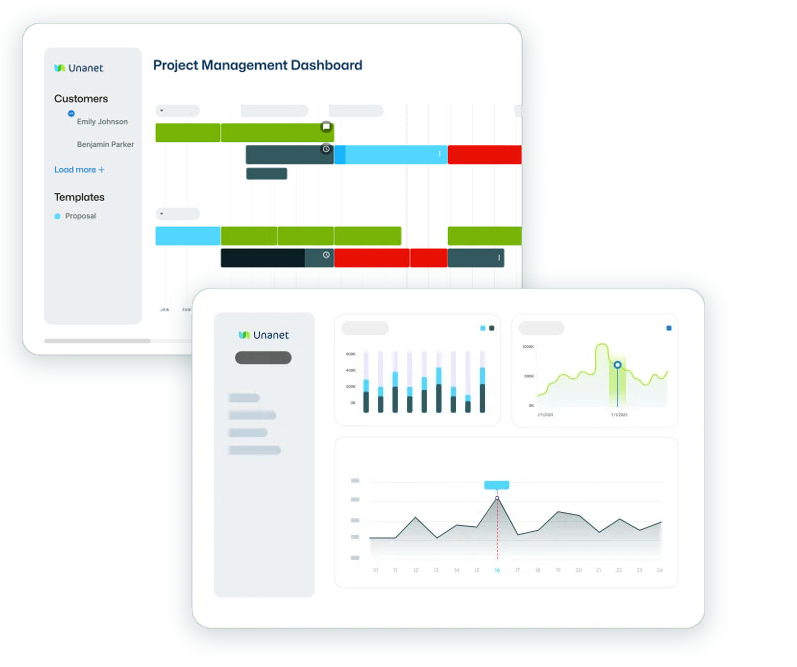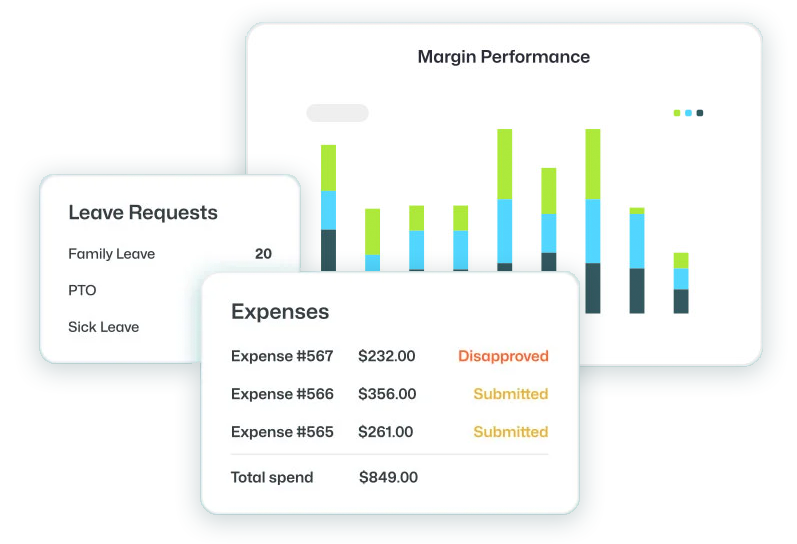Why Unanet is the right ERP for large GovCons
Make success simple. Future-proof your GovCon operations with Unanet.
As a large government contractor (GovCon), you know that the federal government often undergoes changes you’ll need to keep pace with. That means you’ll need an enterprise resource planning (ERP) system that’s forward-thinking, flexible, and adaptable.
What if you could simplify everything by bringing all of your ERP software data, systems, and processes into one simple solution?
One that integrates your technology and business strategy so you can make informed decisions, managing complex projects and intricate compliance requirements?
A single ERP system delivering real-time data available to anyone within your government contracting company who needs it?
At Unanet, we’ve taken 35 years of experience and brought it up to the scale of the largest GovCon firms.


Ease of use
Ease of use
When it comes to an ERP software, simplicity is key. You want a solution that’s easy to implement and easier for your people to use.
You’re also looking for consistency from your GovCon ERP. You want a dependable partner you can efficiently deploy with a simple transition and low costs.
With Unanet, an ERP system purpose-built for government contractors, you’ll combine innovative technology with an intuitive, user-friendly design, making it easy for your team to adopt and use effectively.
Learn more about choosing the right ERP for a large GovCon and how Unanet makes it easy to use.
Everyone [in our organization] saw the need for it. Everyday users loved it. We also had executive leadership who may not be in it day to day but would use the product for features like pipeline reporting.
Scalability
As your government contracting business scales, the number and complexity of projects you manage grow. That’s why it’s crucial to incorporate scalable project management practices into your ERP system while ensuring DCAA compliance. The right ERP not only provides the flexibility and automation you need to efficiently implement and customize various contract types, projects, and tasks but also supports compliance with regulatory requirements, allowing your organization to adapt as your contracts and client demands evolve.
Unanet is designed to grow with your business. Whether you’re expanding your operations or managing complex projects, we can scale effortlessly to meet your needs.
Avoid the long deployment times and complicated transitions you may come to expect from other software solutions. Unanet ERP GovCon's streamlined implementation process minimizes downtime and promotes business continuity.
Learn more about Unanet's scalability
I can use one person that operates Unanet, and that replaces three or four people. From running P&Ls, having expense reports, entering contract modifications into our system, track vacation hours, anything… that’s all there. That covers a lot of bases.
Simple access to unified data
“Una” means one – as in one system and one database that is constantly updated every time anyone approves a timesheet or inputs a new project. Keep everyone from executives to hourly contractors connected, compliant, and coordinated so that you can drive your business with real-time, accurate insights.

In Costpoint, we lacked the real-time data that we needed to be efficient and ultimately strategic. With Unanet, we have seen our monthly closes decrease by 65-68% and we save over $250,000 a year between gained efficiencies and software savings.
Extensive feature set
For government contractors, your ERP solution should have the functionalities required to execute current projects and secure future work. Unanet provides an easily customizable collection of features tailored to help you address all your business challenges, including:
-
Comprehensive data management
We have a host of cutting-edge solutions to help you get more out of your data. As one Unanet customer stated, “It’s a competitive advantage for us to be able to say to clients and prospects, ‘We’re not going to lose your data. We are just as secure as you guys are.’”
Our ERP also includes effective contract management capabilities, ensuring you can manage all your contracts efficiently and in compliance with regulatory requirements.
-
Superior integration
Unanet effectively consolidates your disparate system data so you can stop using multiple platforms to piece together information.
-
Advanced project visibility
Gain unparalleled insight and visibility into your projects, people, and performance with robust project management capabilities. Enjoy quick access to accurate, real-time information through our API, DataLake, or Analytics Studio
-
Stay ahead of complex government compliance requirements
When you’re a large GovCon, you face unique compliance challenges such as EVM, CPSR, CMMC, and other regulatory requirements. Unanet empowers you with the data and documentation you need to stay compliant while keeping the federal government informed. Learn more about our compliance solutions.
-
Easily manage thousands of subcontractors
The unique Subcontractor Portal provides a shared space for federal government contractors to manage their subcontractors. Subcontractor admins can easily onboard, track time and expenses, and submit invoices to match purchase orders. This streamlined process accelerates cash flow and reduces payment cycles by 50-75%.
-
Multiple Legal Entity support
Unanet supports parent company or portfolio company situations common in organizations that serve more than just the federal government or need more complex business architectures due to mergers and acquisitions
-
Flexible Sandbox included
Unanet gives every customer a sandbox environment to help manage roll out of new features, processes, or ways to use their ERP and CRM
-
High Security GovCloud
If you are required to use a FedRAMP High environment, Unanet can support this.
Stay ahead with a consistent, reliable system that evolves with your business, ensuring you remain competitive in any environment. And if you ever need help, you’ll have fast access to a U.S.-based customer service team made up of real people, ready to assist.
Learn more about Unanet’s set of features built specifically for GovCons
If I was having an issue, they were always there. Nobody ever left me hanging and it didn’t cost me a dime extra. They weren’t constantly telling me I had to pay more support costs to get them to help with something. Unanet kept their commitment to support us through it.
Unanet: The ultimate ERP solution for large GovCons
Purpose-built for GovCons, Unanet provides everything you need to stay compliant and competitive.
With us you’re getting more than an easy-to-implement, easy-to-use ERP. You’re also gaining a strategic partner in your success. Our dedication to quality, innovation, and ultra responsive customer service (and customer satisfaction) makes us the best choice for large enterprise GovCons.
Experience the Unanet advantage today. Contact our team to schedule a demo and see firsthand how our ERP can help make business easy.
We started seeing benefits so soon after implementing Unanet. Everything has been super smooth. Unanet’s made my life so much easier.

Frequently asked questions
Ensuring compatibility begins with a thorough assessment of your current IT infrastructure. You can then evaluate whether your existing systems can integrate seamlessly with the new ERP. Look for ERP solutions that offer flexible integration capabilities, APIs, and middleware tools designed to bridge gaps between disparate systems. Engaging with a software provider who specializes in ERP implementations for GovCons can also provide valuable insights and recommendations.
GovCons have unique requirements, such as compliance with the Federal Acquisition Regulation (FAR) and the Defense Federal Acquisition Regulation Supplement (DFARS). As your GovCon grows, especially in cost-plus type contracts, your company is susceptible to more and more complex audits. Your ERP should support intricate cost accounting standards (CAS), project management for large-scale contracts (EVMS), purchasing (CPSR), and supply chain (MMAS). Additionally, it should facilitate adherence to cybersecurity regulations like the Cybersecurity Maturity Model Certification (CMMC) program.
When selecting an ERP solution, consider the following:
- Industry expertise. Ensure the vendor has a proven track record providing support for GovCons.
- Compliance. The ERP must meet all regulatory compliance requirements.
- Scalability. The system should grow with your business.
- Customization. Look for solutions that can be tailored to your specific needs.
- Support and training. Robust support and comprehensive training are essential for successful implementation.
The first step is conducting a needs assessment. Identify the specific requirements of your organization, including compliance standards, functional capabilities, and integration needs. Create a detailed list of must-have features and use this as a benchmark when evaluating potential vendors. Engage stakeholders from various departments to gather input and ensure all needs are addressed.
Customization options vary by vendor but typically include configurable workflows, customizable dashboards, and tailored reporting tools. Some ERPs allow for extensive customization through scripting or development environments, enabling you to create bespoke modules that address unique operational challenges. Ensure that any customizations maintain compliance with industry regulations.
Choose an ERP that is specifically designed to meet government contracting regulations. Verify that the solution includes built-in compliance checks and audit trails. Regularly update your system to comply with evolving regulations and conduct periodic audits to ensure ongoing compliance. Engaging with vendors who offer dedicated compliance support can further enhance your regulatory adherence.
Larger GovCons have a different set of expectations than small-to-midsize businesses. If you’re a large GovCon looking to evaluate and select an ERP, some best practices include:
- Comprehensive needs assessment: Understand your business requirements thoroughly. What specific needs do you have from your ERP?
- Vendor research: Select vendors with a strong reputation in the GovCon space. They should have experience working with large GovCons with customer testimonials to back up their claims.
- Demonstrations and trials: Request demos and trial periods to evaluate the system’s functionality.
- Stakeholder involvement: Involve key stakeholders in the selection process to ensure the ERP meets all departmental needs.
- Future-proofing: Choose a scalable solution that can adapt to future business needs and regulatory changes.
A robust ERP for government contractors should offer advanced reporting and analytics features, including:
- Real-time dashboards: Provide immediate insights into project statuses and financial health.
- Customizable reports: Tailor reports to meet specific regulatory and internal requirements.
- Data visualization: Transform complex data sets into intuitive visual formats for easier interpretation.
- Predictive analytics: Use historical data to forecast future trends and make informed decisions.
- DataLake integration for Business Intelligence and other common analysis tools
- Enterprise API for secure, instant bidirectional data flows
Yes, a well-implemented ERP can break down silos by providing a centralized platform for data and processes. This integration fosters better communication and collaboration across departments, leading to increased efficiency and more informed decision-making.
For your large GovCon, the key considerations for your ERP should include:
- Compliance: Can the ERP meet all regulatory requirements?
- Flexibility: Does the ERP allow for necessary customizations?
- Integration: Can it seamlessly connect with existing systems?
- Scalability: Will the ERP help grow with your business?
- Support: Does the vendor offer comprehensive implementation and ongoing support?
Scalability options include functionality expansions, cloud-based solutions that offer flexible resource allocation, and the ability to add users and capabilities as needed. Your chosen ERP should be able to scale without significant overhauls or disruptions to your operations.
Training and support are critical to successful ERP implementation. You’ll want a vendor who doesn’t view your engagement as one between salesperson and customer, but as an evolving partnership. What support are they able to provide once you’ve purchased the software and are ready to use it? Look for vendors that provide:
- Comprehensive training programs: Both initial and ongoing training should be available to ensure users are proficient.
- Dedicated support teams: Access to knowledgeable support staff who can address issues promptly with on-shore support.
- User manuals and tutorials: Detailed documentation and resources to aid in user education.
Absolutely. A well-implemented ERP optimizes business processes, enhances compliance, and provides valuable insights through advanced analytics. This leads to improved decision-making, increased operational efficiency, and ultimately, a stronger bottom line.
You never want to choose an ERP that demands more than it gives you. You want something that’s going to be easy and intuitive to use. Usability should be a major consideration for you as you look to choose your ERP. You can assess the user experience by:
- Requesting demos: Participate in live demonstrations to see the system in action.
- Conducting user trials: Involve end-users in testing to gather feedback on usability.
- Evaluating interfaces: Review the solution to ensure the ERP has intuitive and user-friendly interfaces. You may want to have expected “superusers” within your organization participate in any demos so they can provide their input on ease of use.
- Reviewing case studies: Look at success stories and testimonials from similar organizations.
Not all ERPs are created equal, and many have red flags that should prohibit you from moving forward. Some common ERP challenges include:
- High costs: ERP systems can be a significant investment. If you pick one that costs too much and doesn’t deliver value on the back end, it can be a problem.
- Complex implementation: Transitioning to a new ERP can disrupt operations if not managed properly.
- Customization needs: Balancing standard features with the need for custom solutions.
- Regulatory compliance: Ensuring the ERP meets all necessary regulatory requirements.
Assess scalability by evaluating:
- Ability to add functionalities: Can new functionalities be added as needed?
- Cloud capabilities: Does the ERP offer cloud solutions that scale with your business?
- Vendor roadmap: Review the vendor’s future plans and updates to ensure long-term scalability.
- User capacity: Determine if the ERP can easily accommodate an increasing number of users.
Security considerations include:
- Data encryption: Ensure sensitive data is encrypted both in transit and at rest.
- Access controls: Implement robust access controls to limit data exposure.
- Compliance with standards: Verify the ERP complies with relevant security standards like NIST (National Institute of Standards and Technology) guidelines.
- Regular audits: Conduct regular security audits to identify and mitigate vulnerabilities.
Yes, modern ERPs are designed with compliance in mind – if you pick the right one, of course. Modernized ERPs offer features such as audit trails, compliance reporting, and automated checks against regulatory standards, making it easier to conform to both existing and potential future regulations.
A well-designed ERP should offer flexibility and ease of implementation across various departments. Look for solutions that provide modular deployment options and robust integration capabilities to ensure smooth adoption throughout your organization.
Critical features include:
- Compliance management: Tools to ensure adherence to government regulations.
- Project management: Advanced capabilities for managing large contracts.
- Cost accounting: Support for complex cost structures and reporting.
- Data integration: Seamless integration with existing systems.
- Security features: Robust security protocols to protect sensitive data.